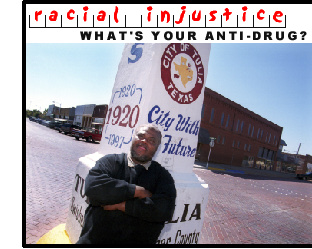
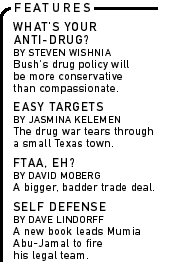
|
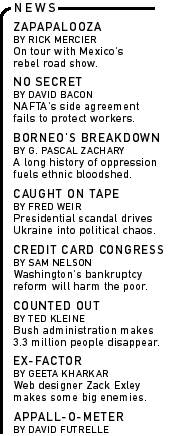
|
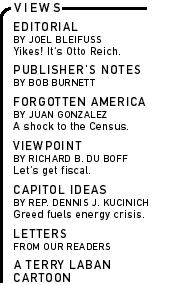
|
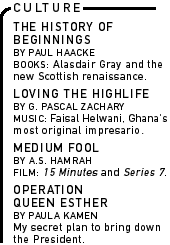
|
| |
|
|
|
In the early morning hours of July 23, 1999, Swisher County police raided trailers and public housing units here, arresting residents accused of selling cocaine to an undercover mole. The culmination of an 18-month sting operation in conjunction with the Panhandle Narcotics Task Force, police arrested 43 people, 40 of whom were black--more than 10 percent of the town's black community. Local newspapers quickly set about congratulating the operation. One editorial excoriated the "scumbag dealers" and likened them to a "cancer" deserving a "major dose of chemotherapy behind bars." The undercover police officer was later named "Lawman of the Year" by the Texas Department of Public Safety. But the newspapers and accolades consistently failed to mention that no drugs,
Tulia is a scrappy town of 5,000 surrounded by fields of cotton, located between Lubbock and Amarillo. Faced with few opportunities besides manual labor jobs at the local livestock auctioning barn, the mostly black, idle and disillusioned kids who couldn't afford to escape after graduation became easy fodder for Texas police departments earning their bread and butter fighting the drug war. This type of operation is common throughout the state. Narcotics task forces depend on high body counts to keep the federal funds flowing. Devastated by a shrinking rural economy throughout this part of the country, blacks are those least able to seek their fortunes elsewhere. Hence, if a task force wants convictions, its best bet is to focus its investigations across the tracks. Statistics compiled by the Justice Policy Institute show that in Texas blacks are incarcerated at a rate seven times higher than whites. This is nearly 63 percent higher than the national average. Robertson County District Attorney John Paschall, former head of the South Central Texas Task Force, says the number of black men arrested is so high because "they're the easiest ones to get because they're selling on the street." But Gary Buchanan, police chief of the east Texas town of Brenham and director of the Independence Narcotics Task Force, says task forces have lost sight of their goal and are more focused on catching easy targets rather than stemming the flow of drugs. "It's a numbers game," Buchanan says. "We're fighting the same battles as 10 years ago. Heroin is coming back. LSD is back. You don't have to show any impact, just numbers." In Tulia, blacks experienced firsthand the dubious methods available to task forces that wish to artificially boost their statistics. The black community knew something had gone awry when they learned people were being indicted for selling powder cocaine. Police charged them with delivering "eight balls"--an eighth of an ounce of cocaine, which at $180 a pop is significantly more expensive than the small bags of marijuana and cheap rocks of crack cocaine usually found in this depressed rural community. "Ain't nobody got powder in this town," says Sam Barrow, a Tulia resident who had four relatives caught in the sting. "A $10 rock, OK. But they were accusing people of carrying an eight ball in their pockets, and you know just the other day he tried to get $5 off of you for gas." Most of those arrested agreed to plea bargains with prosecutors. For those suspects whose cases went to trial, part-time cotton farmer and full-time civil libertarian Gary Gardner was skeptical they could receive a fair hearing in Tulia, because he felt the city had an interest in whipping up drug hysteria. He urged the defendants to request a change of venue. The requests were denied for all but two white defendants, and the court quickly began dispensing its own version of justice--multiple life sentences for several deliveries of cocaine and 20 years for a single delivery with no prior convictions. Additional felony charges were tacked onto the cases because the agent claimed the deals had occurred in a public park. In all, 22 of those arrested were sent to prison. The stiff sentences were made possible by a series of laws then Gov. George W. Bush signed in 1997 as part of his "get tough on crime" platform. A first-offense cocaine charge, which had previously been a misdemeanor punished with mandatory probation, was upgraded to a felony. He also created "drug-free zones" around schools and parks, in which any drug activity was automatically a felony charge. Even more disturbing was the incredibly low standard of evidence needed for a conviction. All of the indictments centered around the uncorroborated testimony of Tom Coleman, the undercover agent planted by the Panhandle Regional Task Force. The sole witness against the defendants, Coleman's police reports never amounted to more than a couple of paragraphs, and he frequently presented conflicting testimony while on the stand. A probing defense attorney, Paul Holloway, discovered Coleman had been described as a "compulsive liar" in court documents and had been arrested during the sting operation for a string of unpaid debts in other counties. He also discovered that Coleman's former boss, Cochran County Sheriff Ken Burke, had filed a complaint with the Texas Commission of Law Enforcement (TCLE), the state agency that licenses police officers, in which he wrote: "Mr. Coleman should not be in law enforcement." The judge denied the defense motion to introduce any of the evidence about Coleman's past. Further impugning Coleman's credibility was the case of Billy Wafer, who was arrested and charged with arranging the delivery of 2.3 grams of crack. Wafer was more than nine years into a 10-year probation, and faced life in prison once charges of breaking probation and delivering drugs near a "drug-free zone" were added. Yet timecards and his boss' testimony proved Wafer was at work when the alleged sale occurred, so the charges were dropped. But not before he spent two weeks in jail, lost his job and was turned down for a home loan. Holloway charges that local law enforcement officials worked in concert to manufacture charges against Tulia's mostly indigent black community. Some defendants did admit selling crack to Coleman, but Holloway speculates that the cocaine found in the reported deliveries came from a single source that Coleman himself spliced and mixed with the crack to upgrade the charges. Holloway believes Coleman was charging the task force for purchases of cocaine but buying crack. A chemist found that the amount of cocaine in many of these baggies was not even enough to get high on and was of poor quality. Yet due to a quirk in Texas drug law, an eight ball has to contain only a trace of cocaine for the entire weight to be registered as a cocaine delivery. The judge refused to provide funds for an outside investigator and denied the request to run laboratory tests that could prove Holloway's theories. What most upsets Holloway is that the judge's obstinacy and the jury's willingness to overlook Coleman's often conflicting testimony is perfectly legal according to Texas judicial procedure. "It's a joke to do criminal defense here," Holloway says. "If the jury wants to sit and watch a cop lie, they can. These were marginal people on the stand and [the jury] just decided to believe the cop." William Harrell, head of the Texas ACLU, agrees and blames the Tulia debacle on Texas' poor record of indigent defense. Texas, he says, is at the "bottom of the barrel" when it comes to defending poor people. Although statewide statistics are not available, a 1999 Houston Chronicle study of 1,800 first-offense cocaine charges found that 21 percent of defendants who hired attorneys were sentenced to jail or prison time compared to 53 percent of defendants with court-appointed attorneys. Judges in Texas are elected in a culture where "getting tough on crime" enjoys bipartisan support and constitutional niceties are often ignored, Harrell says. These same judges appoint defense attorneys and determine their salaries. Critics say the current method of appointing lawyers inherently discourages defense attorneys from mounting a zealous defense and pressures lawyers to seek plea bargains. "It's an unconstitutional system of criminal defense," Harrell says. Holloway, who spent nearly 1,000 hours researching his defense, was authorized to receive payment for only the first 10 hours he spent on a case. "They didn't want me to defend this case," says Holloway, who ended up accepting a plea bargain for his clients. "It was like making a deal with the devil, I knew we couldn't win." Yet as a result of the racial imbalance of the sting's victims and shoddy police work presented to the courts, the NAACP and the ACLU filed a lawsuit and a complaint with the Justice Department, claiming that Coleman conspired with the sheriff and the district attorney to deny local blacks their civil rights. Prisoners report that FBI agents have interviewed them about Coleman's behavior during the operation. County officials and Coleman's supervisors refused to comment on the charges. Sadly, this small town is not alone. Harrell says the ACLU is currently investigating six "Tulias" around the state. "There's a pattern of narcotics task forces operating on DEA funding, hiring the most amazingly unscrupulous informants to hunt down suspects, 90 percent of whom end up being black or Latino." To protect Texans against the drug war, the ACLU and the NAACP have proposed a series of laws they're calling the "Tulia Proposals," which would require corroboration for testimony of undercover officers, limit the authority of judges to exclude evidence pertaining to a person's innocence and provide public access to TCLE records. "Our system rests on the premise that the gatekeeper of evidence
will act justly," Holloway says. "Coleman could steamroll anyone
because in a swearing match between a cop and a citizen, the cop
wins. From my perspective it's a really scary world." Read Steven Wisnia's article, "What's Your Anti-Drug?"
|


